This was an exciting week for Bitcoin BTC/USD holders and hodlers as the fourth-ever halving took place on Friday. The American consumer got back to work spending ever more on goods and services. Some of that was inflation and some was more consumption. That same consumer is a bit overstretched and some have started paying fees to use buy now, pay later services on rent. While consumers are using more credit, small businesses are finding that more difficult to source. Continuing our series on problems in commercial real estate, tech companies have continued to reduce leasing office space. Finally, DKI Intern, Andrew Brown, provides his view on where young people are having financial difficulties and offers excellent suggestions to begin addressing the problem. Let me know if you’d replace Janet Yellen with Andrew as Secretary of the Treasury.
This week, we’ll address the following topics:
-
The Bitcoin halving is here! The Bitcoin halving is here!
-
Good or bad economy, the American consumer continues to spend.
-
Buy now, pay later…for rent?! What could go wrong?
-
Consumers are using more credit. What about corporations?
-
Tech companies reducing office footprint – the next problem in commercial real estate.
-
Think the economy is in good shape? Think young people are just soft and entitled? Let’s hear from one of them and consider whether his opinion has merit.
Ready for a new week of twice as much information? Let’s dive in:
-
The Bitcoin Halving is Here:
There will be a total of 21MM Bitcoins mined from inception through the middle of the next century. However, those coins won’t be mined on a consistent schedule. Just 17 years into Bitcoin’s existence, about 19.7MM have been mined. That’s almost 94% of the total supply. Approximately every four years, the reward for miners gets cut in half. That means that by the time you read this, daily creation of new Bitcoin will fall from about 900 per day to 450. This is happening at a time when concerns about the debasement of the dollar and other fiat currencies is increasing and when ETFs are allowing a new class of investors to start to buy Bitcoin.
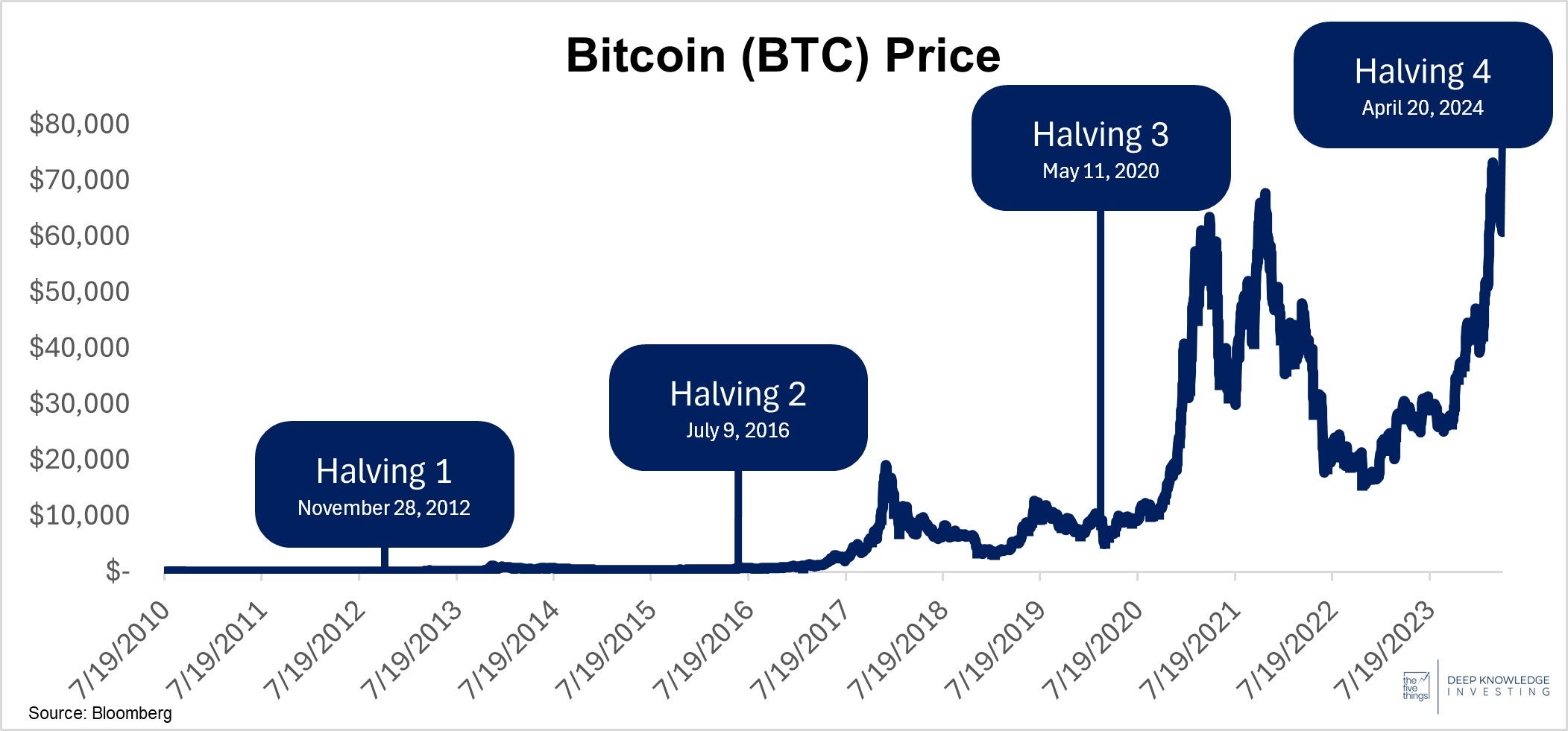
A lot of people think Bitcoin will rally post-halving. What do you think?
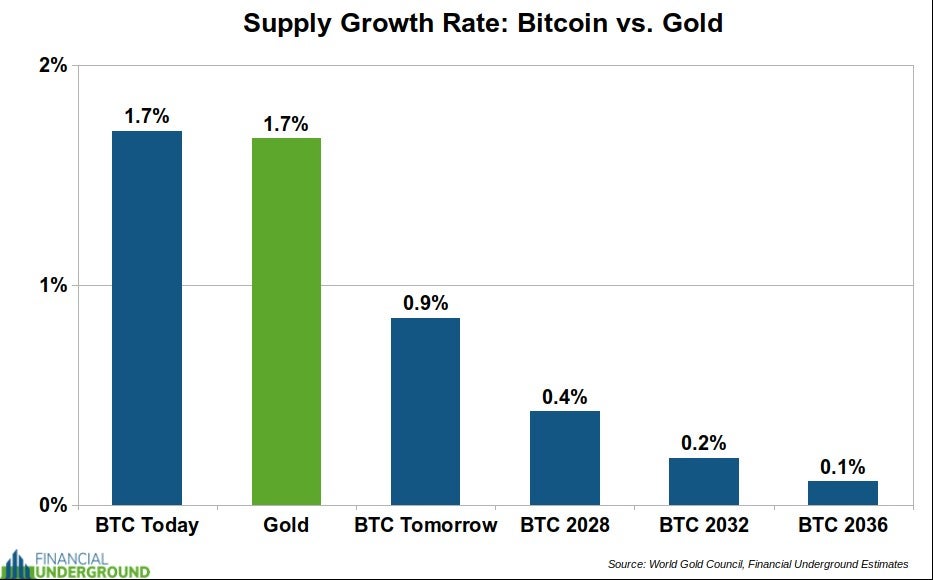
Now harder than gold. Chart from Financial Underground.
DKI Takeaway: One reason the dollar price of gold keeps rising and is now at an all-time high is because the supply of gold only increases approximately 2% a year. In contrast, Congress and the US Treasury think nothing of overspending by trillions of dollars each year and just adding to the debt as if the US will never need to pay what it owes. By the time you read this, Bitcoin will have become “harder” than gold. That means the creation of new units compared to the total supply available is even lower for Bitcoin than gold. As for the “hardness” of the US dollar, that’s a disaster which we’re all experiencing as inflation. DKI owns both Bitcoin and gold.
-
Americans Continue to Spend – A Lot:
Retail sales were up 0.7% this month. That was well above expectations of 0.3% and annualizes to 8.7%. Most of that increase was higher prices as the CPI was up 0.4% from the prior month, and DKI thinks the CPI is understated. Higher gas prices also have an impact even as Americans commute less than they did a few years ago.
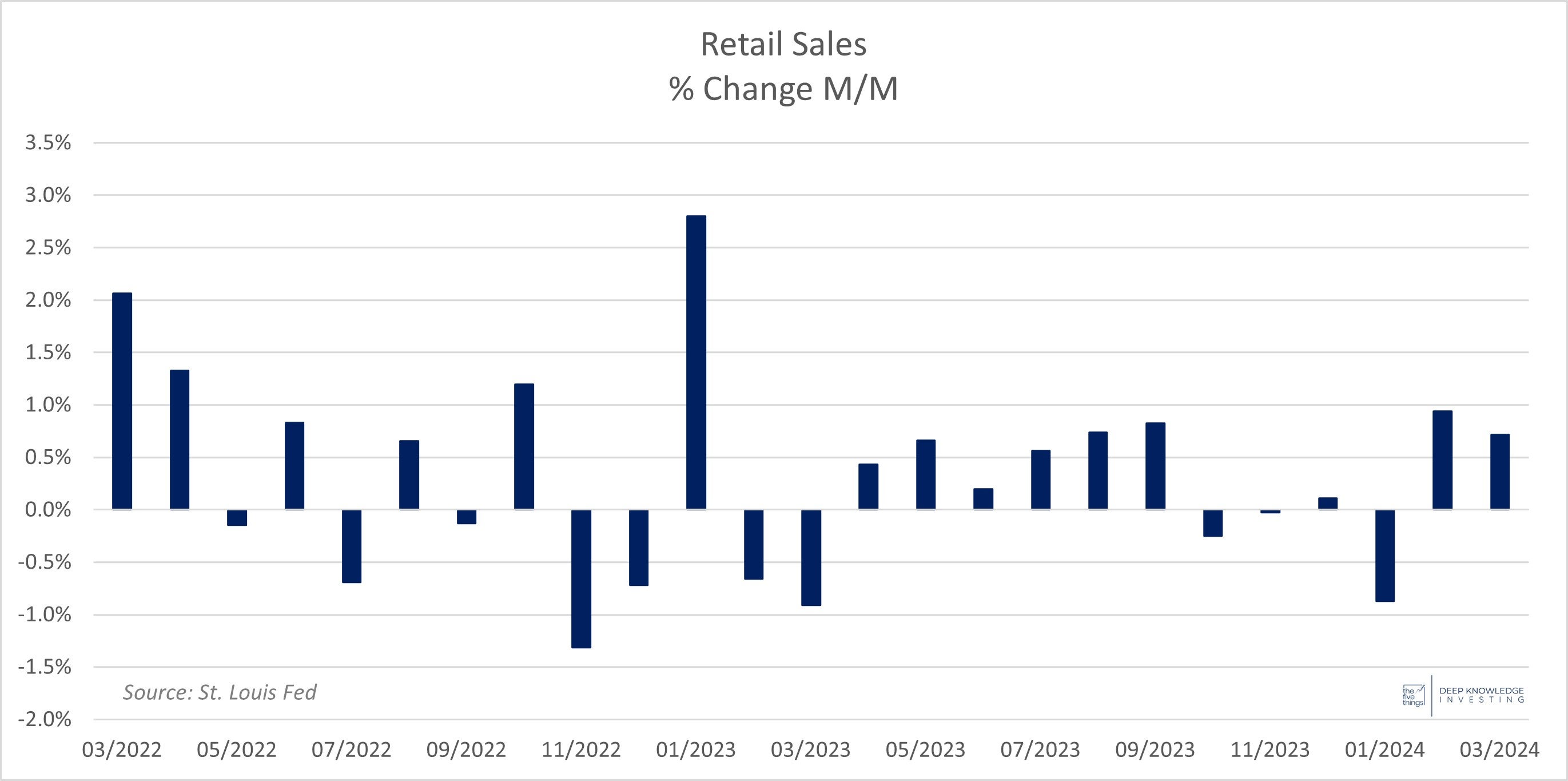
It was another month of big spending following four months of weaker results.
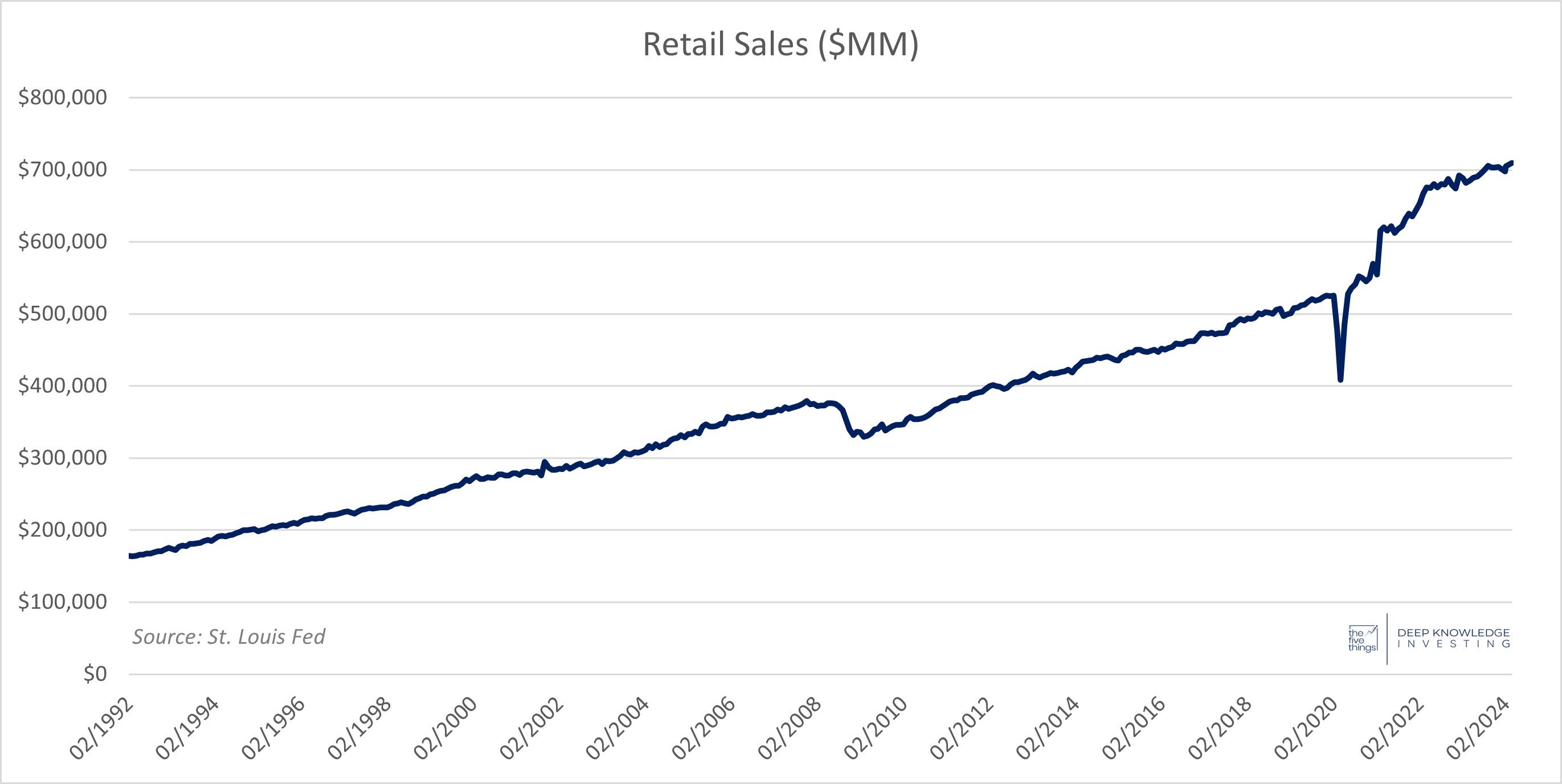
Americans aren’t thrilled with “disinflation” because prices keep rising off of a higher base.
DKI Takeaway: While I think it’s unwise to live beyond your means, it’s easy to understand why consumers keep spending. The government exercises no spending restraint and refuses to acknowledge tradeoffs between program benefits and costs. Bank bailouts in 2008 are still fresh in the memories of many, and now, people who never went to college are about to get the bill for the degrees of others. Neither the banks, nor the universities, nor the people who financed the student loans will suffer those losses. In this environment, who’s left to credibly preach financial restraint?
-
Buy Now, Pay Later for Rent. What Could Go Wrong?:
DKI has previously reported on the expanded use of buy now, pay later (BNPL) including when people started using it at fast food restaurants. (A McDonalds happy meal on layaway?) Companies like Flex are advertising that using BNPL to pay your rent is about “taking control” of your finances. Flex charges people who want the liberation of not having to pay their rent on time a $14.99 monthly fee plus just 1% of the payment amount. So, what could go wrong?
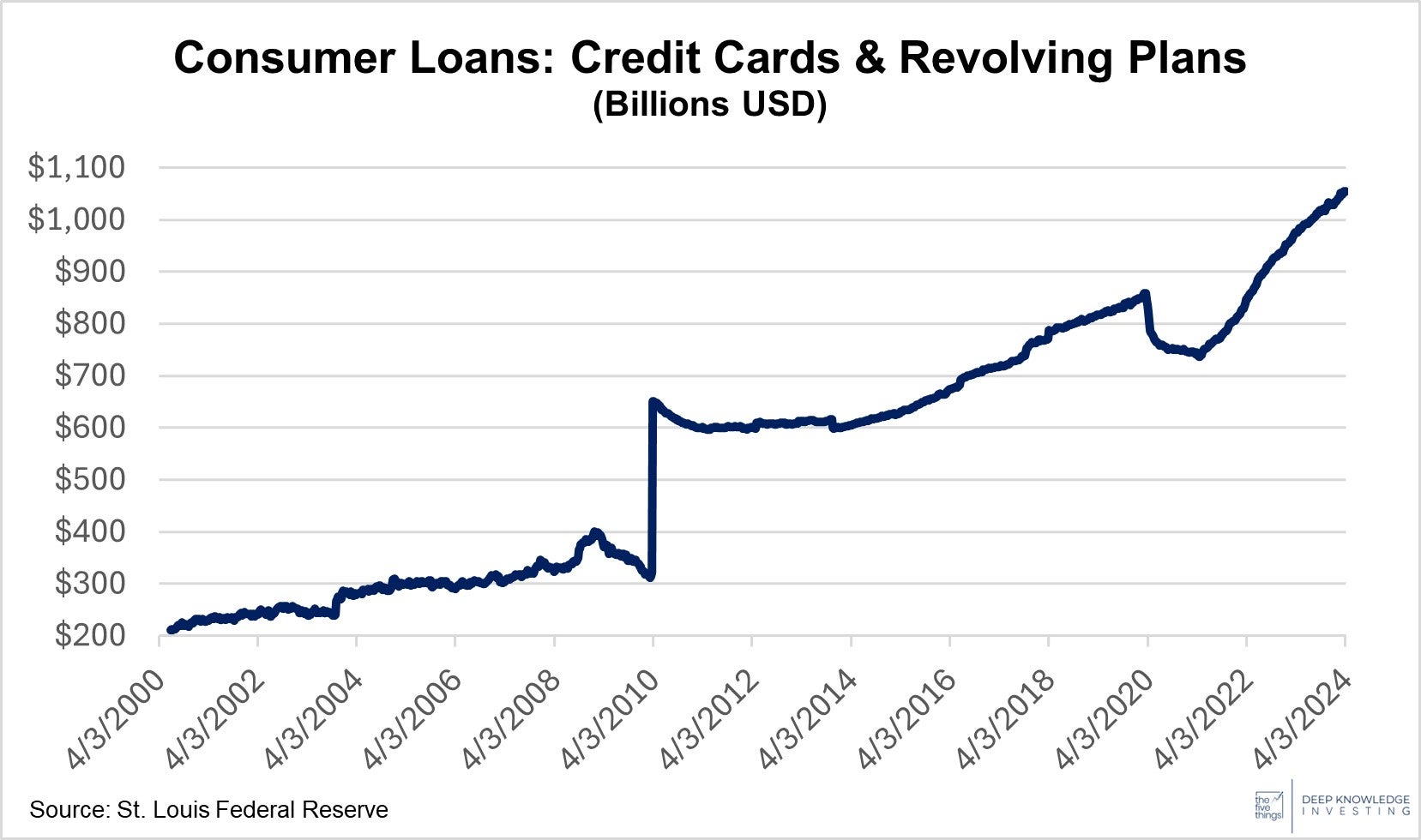
The perfect time to launch new credit products
DKI Takeaway: Terms marketed as “freedom” to “take control” of your rent payments really mean pay later for a financing fee. In general, people who want to pay late do so because they’re falling behind; a trend that’s likely to continue. At that point, Flex starts charging up to a 36% APR on outstanding balances. Unsurprisingly, that part is in the fine print that’s harder to find than the cartoon videos advertising the “benefits”. These products are great to help people who need an occasional delay to avoid bouncing a check or being late with the rent. When it’s something people rely on, it’s easy for this to become a trap.
-
Is Bank Credit a Mark of Economic Strength?:
Consumers are spending more and financing more, but for corporations, the situation is different. After increasing credit usage during the Covid years, commercial bank credit has been on a plateau for the past year. Historically, the use of credit by businesses to expand has been correlated with a strong economy and private sector growth. Recession fears combined with banks reducing liquidity has caused credit use by corporations to stall.
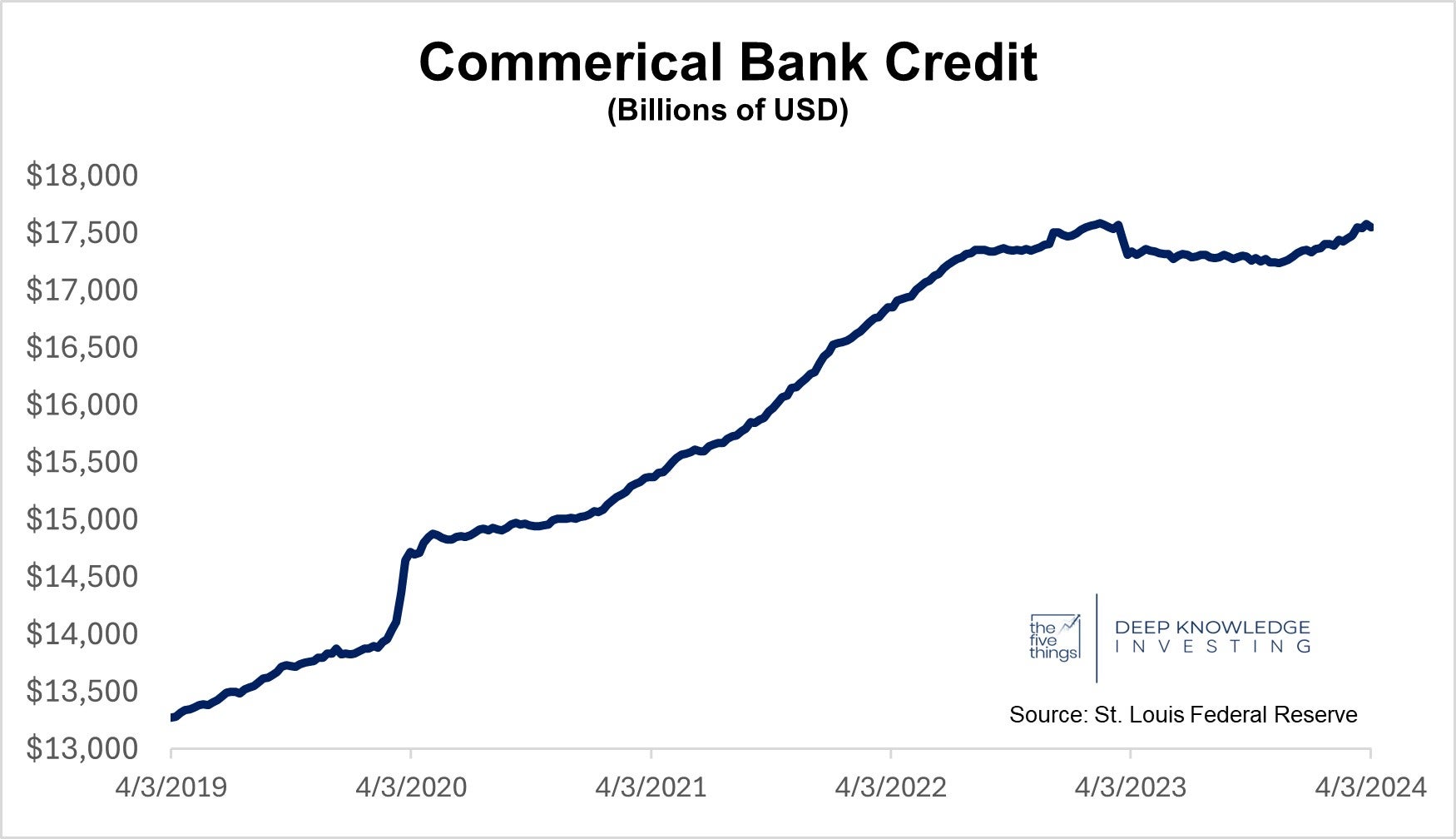
This is not a sign of a growing economy.
DKI Takeaway: Many economists predicted a recession in 2024. DKI disagreed and said that massive governmental stimulus would skew the numbers and keep us out of an official recession. Government spending is becoming a larger part of GDP and is masking weakness in the private economy. Banks have slowed lending, businesses have been reducing growth and investing plans, and inflation has started to increase again. The mainstream press continues to run articles admonishing Americans for not appreciating our great economy. All new jobs are part-time and almost all of them are either in government or in sectors of the economy financed by government. There’s a reason people in the productive private economy are dissatisfied.
-
Tech Companies Reducing Office Footprint:
We’ve been reporting on problems in the commercial real estate sector for the past few editions of The Five Things. More people moving away from big cities combined with employees’ insistence on working from home/anywhere are putting pressure on the commercial office space market. This week, the Wall Street Journal reported on technology companies reducing the amount of office space they use. Due to the nature of their work, tech employees are well-equipped to be effective outside the office. Making the situation worse, tech companies defensively grabbing more office space than they needed contributed to huge growth in the rental markets in hubs like Seattle and San Francisco. That’s being reversed. The WSJ now reports that “San Francisco’s office-vacancy rate hit a record 36.7% in 1Q”. That’s up from 3.6% in 2019.
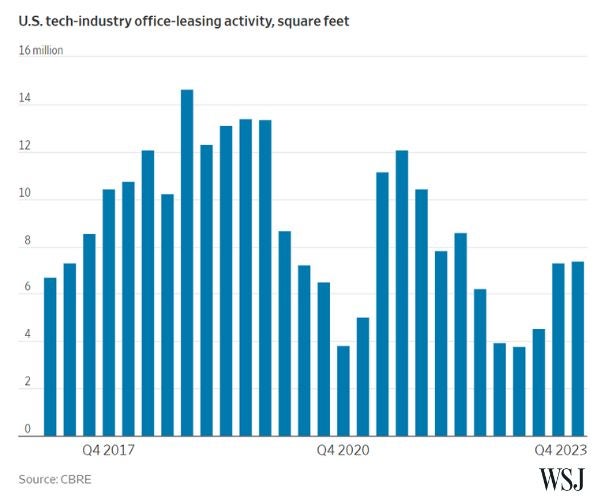
Employers still having trouble getting people back in the office. Chart by Wall Street Journal.
DKI Takeaway: Every week, we’re relaying more problems in the commercial real estate market, and the fear is that this will become the 2024 version of the housing market in 2008. On the positive side, there’s probably less leverage in the commercial side now than in the housing market then. On the negative side, housing demand didn’t disappear, but demand for office and retail space is vaporizing. We’ve heard rumors that Washington DC already has a plan to bail out overleveraged property owners and the banks that lend to them. DKI hopes that doesn’t happen. Until people suffer the consequences of making bad decisions, we’re going to keep getting more bad decisions, and will have intensifying boom and bust cycles.
-
The Economy from the Point of View of Someone Who’s 20:
Written by DKI Intern, Andrew Brown: American have been struggling financially in many ways, but especially the younger generations. Inflation has made it more difficult for my generation to buy a home, or even to afford food at the grocery store. A core driver of the struggle is government spending and incompetency which is a bipartisan problem. As DKI has written, government involvement in education funding has incentivized universities to raise tuition to levels that don’t match the job prospects of their graduates. Excessive government spending has locked us into $3.8 trillion of annual obligations that can only be adjusted with changes to benefit programs, something that politicians and voters reject. Unless Washington addresses this issue, continued overspending means my generation will be the ones to pay the price.
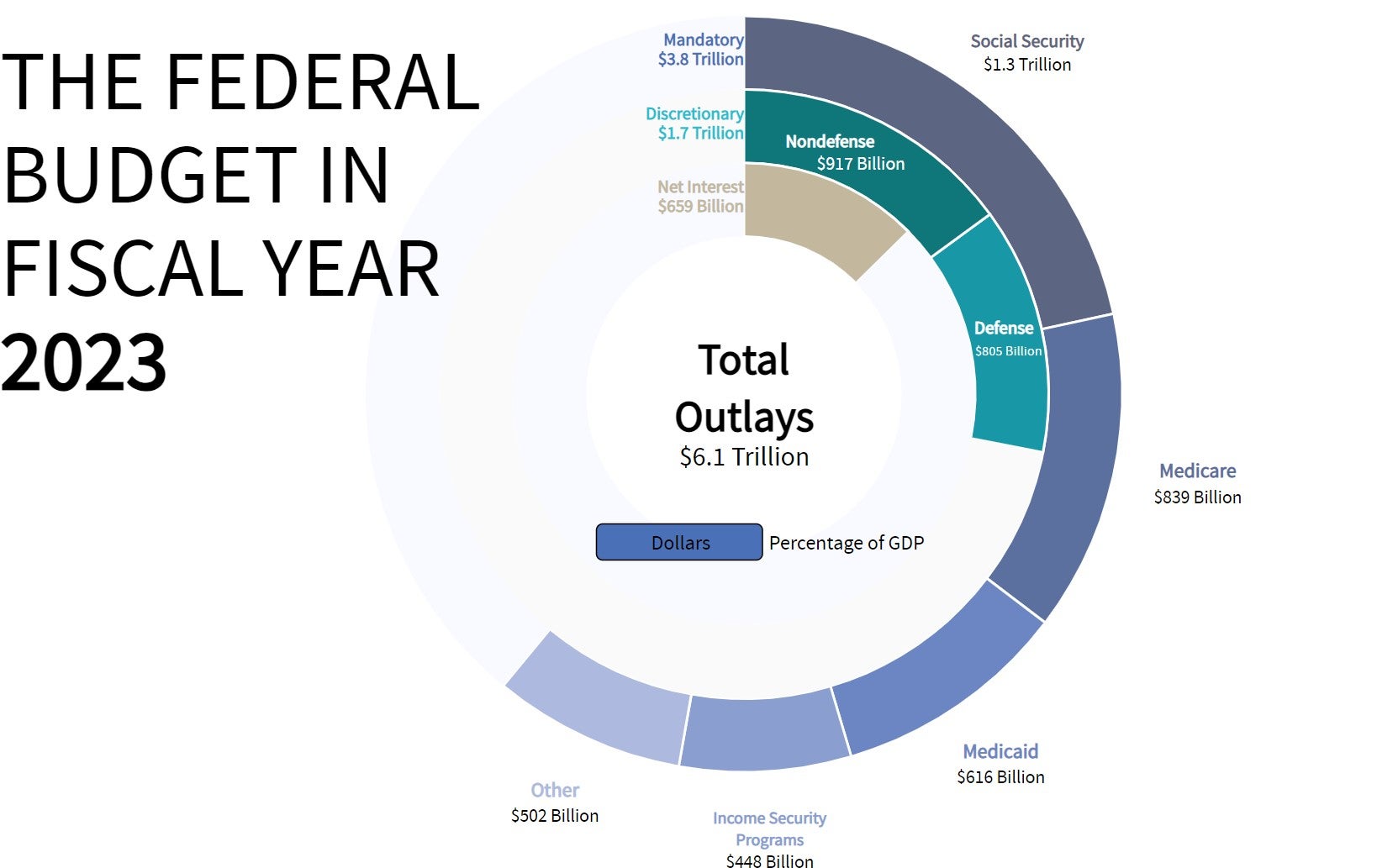
DKI notes that this graph shows interest expense of $659B. By next year, that will be at least $1 trillion short. Graph from the CBO.
DKI Takeaway: The government likes to preach that people should gain financial literacy and save, but it doesn’t live by those guidelines. The government is unable to manage a budget or evaluate tradeoffs. They are in charge of education, but spend no time and effort teaching finance and budgeting to students. The schools do not prepare students for the workplace. Teaching students to save and invest could reduce the Social Security burden that will fall on me and my peers. Starting to prepare for that now would reduce our future reliance on these bankrupt programs and could reduce government spending. Long-term, that would reduce government deficits and result in lower inflation; something many of you in older generations might appreciate. (Gary here – Andrew is DKI’s 8th intern and they all understand this issue. The problem existed before they were old enough to vote. Spend some time with these young people, and you’ll quickly realize many of them are smart, worldly, hard-working, and lack any sense of entitlement. Well done, Andrew!)
Information contained in this report, and in each of its reports, is believed by Deep Knowledge Investing (“DKI”) to be accurate and/or derived from sources which it believes to be reliable; however, such information is presented without warranty of any kind, whether express or implied. DKI makes no representation as to the completeness, timeliness, accuracy or soundness of the information and opinions contained therein or regarding any results that may be obtained from their use. The information and opinions contained in this report and in each of our reports and all other DKI Services shall not obligate DKI to provide updated or similar information in the future, except to the extent it is required by law to do so.
The information we provide in this and in each of our reports, is publicly available. This report and each of our reports are neither an offer nor a solicitation to buy or sell securities. All expressions of opinion in this and in each of our reports are precisely that. Our opinions are subject to change, which DKI may not convey. DKI, affiliates of DKI or its principal or others associated with DKI may have, taken or sold, or may in the future take or sell positions in securities of companies about which we write, without disclosing any such transactions.
None of the information we provide or the opinions we express, including those in this report, or in any of our reports, are advice of any kind, including, without limitation, advice that investment in a company’s securities is prudent or suitable for any investor. In making any investment decision, each investor should consult with and rely on his or its own investigation, due diligence and the recommendations of investment professionals whom the investor has engaged for that purpose.
In no event shall DKI be liable, based on this or any of its reports, or on any information or opinions DKI expresses or provides for any losses or damages of any kind or nature including, without limitation, costs, liabilities, trading losses, expenses (including, without limitation, attorneys’ fees), direct, indirect, punitive, incidental, special or consequential damages.
© 2025 Benzinga.com. Benzinga does not provide investment advice. All rights reserved.
Trade confidently with insights and alerts from analyst ratings, free reports and breaking news that affects the stocks you care about.